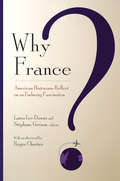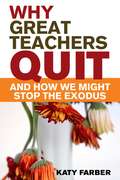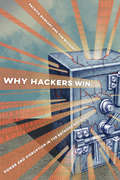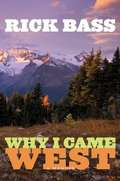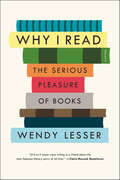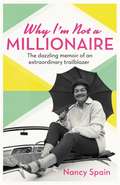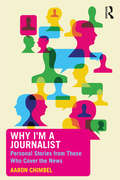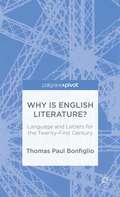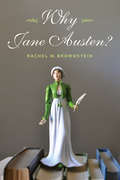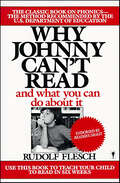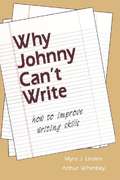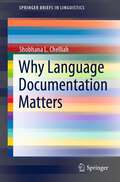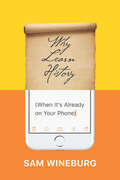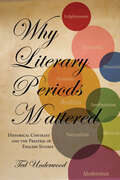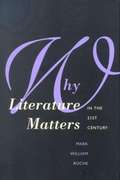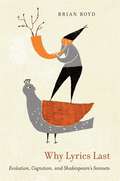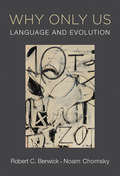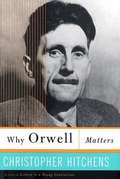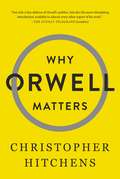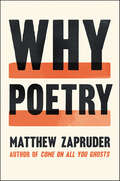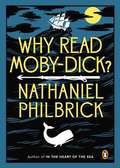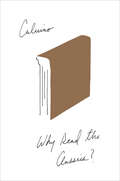- Table View
- List View
Why France?: American Historians Reflect on an Enduring Fascination
by Roger ChartierFrance has long attracted the attention of many of America's most accomplished historians. The field of French history has been vastly influential in American thought, both within the academy and beyond, regardless of France's standing among U.S. political and cultural elites. Even though other countries, from Britain to China, may have had a greater impact on American history, none has exerted quite the same hold on the American historical imagination, particularly in the post-1945 era. To gain a fresh perspective on this passionate relationship, Laura Lee Downs and Stéphane Gerson commissioned a diverse array of historians to write autobiographical essays in which they explore their intellectual, political, and personal engagements with France and its past. In addition to the essays, Why France? includes a lengthy introduction by the editors and an afterword by one of France's most distinguished historians, Roger Chartier. Taken together, these essays provide a rich and thought-provoking portrait of France, the Franco-American relationship, and a half-century of American intellectual life, viewed through the lens of the best scholarship on France.
Why Great Teachers Quit and How We Might Stop the Exodus: And How We Might Stop The Exodus
by Katy FarberLearn why today’s best teachers are leaving-from the teachers themselves.Low pay, increased responsibilities, and high-stakes standardized testing-these are just some of the reasons why more talented teachers are leaving the profession than ever before. Drawing on in-depth interviews with teachers all over the country, Katy Farber presents an in-the-trenches view of the classroom exodus and uncovers ways that schools can turn the tide.Farber's findings, which have been featured on Education Talk Radio, Vermont Public Radio, and in the Huffington Post, paint a sometimes shocking picture of life in today's schools, taking a frank look at Challenges to teacher endurance, including tight budgets, difficult parents, standardized testing, unsafe schools, inadequate pay, and lack of respect Strategies veteran teachers use to make sure the joys of teaching outweigh the frustrations Success stories from individual schools and districts that have found solutions to these challenges Recommendations for creating a school environment that fosters teacher retentionFeaturing clear analysis and concrete suggestions for administrators and policy makers, Why Great Teachers Quit takes you to the front lines of the fight to keep great teachers where they belong: in the classroom.
Why Hackers Win: Power and Disruption in the Network Society
by Patrick Burkart Tom McCourtWhen people think of hackers, they usually think of a lone wolf acting with the intent to garner personal data for identity theft and fraud. But what about the corporations and government entities that use hacking as a strategy for managing risk? Why Hackers Win asks the pivotal question of how and why the instrumental uses of invasive software by corporations and government agencies contribute to social change. Through a critical communication and media studies lens, the book focuses on the struggles of breaking and defending the “trusted systems” underlying our everyday use of technology. It compares the United States and the European Union, exploring how cybersecurity and hacking accelerate each other in digital capitalism, and how the competitive advantage that hackers can provide corporations and governments may actually afford new venues for commodity development and exchange. Presenting prominent case studies of communication law and policy, corporate hacks, and key players in the global cybersecurity market, the book proposes a political economic model of new markets for software vulnerabilities and exploits, and clearly illustrates the social functions of hacking.
Why I Came West
by Rick BassIn this poignant look at the thirty-year journey of one of our country's great naturalist writers, Rick Bass describes how he fell in love with the mystique of the West--as a dramatic landscape, as an idea, and as a way of life. Bass grew up in the suburban sprawl of Houston, and after attending college in Utah he spent eight years working in Mississippi as a geologist, until one day he packed up and went in search of something visceral, true, and real. He found it in the remote Yaak Valley of northwestern Montana, where despite extensive logging not a single species has gone extinct since the last Ice Age. Bass has lived in "the Yaak" ever since, and in Why I Came West he chronicles his transformation into the writer, hunter, and environmental activist that he is today. He explains how the rugged, wild landscape smoothed out his own rough edges; attempts to define the appeal of the West that so transfixed him as a boy, a place of mountains and outlaws and continual rebirth; and tells of his own role as a reluctant activist--sometimes at odds with his own neighbors--unwilling to stand idly by and watch this treasured place disappear. Rick Bass is the author of many acclaimed books of nonfiction and fiction, including The Lives of Rocks, The Diezmo, and Winter.
Why I Read: The Serious Pleasure of Books
by Wendy Lesser"Wendy Lesser's extraordinary alertness, intelligence, and curiosity have made her one of America's most significant cultural critics," writes Stephen Greenblatt. In Why I Read, Lesser draws on a lifetime of pleasure reading and decades of editing one of the most distinguished literary magazines in the country, The Threepenny Review, to describe her love of literature. As Lesser writes in her prologue, "Reading can result in boredom or transcendence, rage or enthusiasm, depression or hilarity, empathy or contempt, depending on who you are and what the book is and how your life is shaping up at the moment you encounter it." Here the reader will discover a definition of literature that is as broad as it is broad-minded. In addition to novels and stories, Lesser explores plays, poems, and essays along with mysteries, science fiction, and memoirs. As she examines these works from such perspectives as "Character and Plot," "Novelty," "Grandeur and Intimacy," and "Authority," Why I Read sparks an overwhelming desire to put aside quotidian tasks in favor of reading. Lesser's passion for this pursuit resonates on every page, whether she is discussing the book as a physical object or a particular work's influence. "Reading literature is a way of reaching back to something bigger and older and different," she writes. "It can give you the feeling that you belong to the past as well as the present, and it can help you realize that your present will someday be someone else's past. This may be disheartening, but it can also be strangely consoling at times." A book in the spirit of E. M. Forster's Aspects of the Novel and Elizabeth Hardwick's A View of My Own, Why I Read is iconoclastic, conversational, and full of insight. It will delight those who are already avid readers as well as neophytes in search of sheer literary fun.
Why I'm Not A Millionaire: The dazzling memoir of an extraordinary trailblazer
by Nancy SpainThe superb classic memoir from a dazzlingly eccentric and endlessly fascinating author - a woman very much ahead of her time.'She was bold, she was brave, she was funny, she was feisty. I owe her a great deal in leading the way' Sandi ToksvigNancy Spain was one of the most celebrated - and notorious - writers and broadcasters of the 40s, 50s and 60s. Hilarious, controversial and brilliant, she lived openly as a lesbian (sharing a household with her two lovers and their various children) and was frequently litigated against for her newspaper columns - Evelyn Waugh successfully sued her for libel... twice. She was also a fantastic crime novelist (and according to the Guardian, one of the 50 best female crime thriller writers of all time) writing with a unique style that marries the acid wit of Dorothy Parker with the intricacy of plotting worthy of Agatha Christie. WHY I AM NOT A MILLIONAIRE, has the same wit, style and fascinating detail - first published in 1956, with an introductory note from Noel Coward. After her death in a plane crash in 1964, Noel Coward commented: 'It is cruel that all that gaiety, intelligence and vitality should be snuffed out, when so many bores and horrors are left living.'
Why I'm a Journalist: Personal Stories from Those Who Cover the News
by Aaron ChimbelWhy be a journalist? It can be a difficult job with long hours, hard work and an uncertain future. Journalists face relentless criticism and an industry in transition. Aaron Chimbel has put together a collection of essays from working journalists who answer the question — why be a journalist? — with their personal stories of coming up, toiling in the field and writing important, career-defining stories. These journalists come from different platforms, beats and locations, offering varying accounts of the travails and rewards of being a working journalist across changing landscapes and timelines. The essays in Why I’m a Journalist offer encouragement and wisdom about the path to being a reporter, a broadcaster, an editor or a media professional. This is a collection for students interested in the field, early upstarts engaged with building their careers and seasoned pros looking to learn from their colleagues.
Why Is Daddy in a Dress?: Asking Awkward Questions with Baby Animals
by Ben Schwartz Amanda McCallWhy face the embarrassment of dealing with life's most awkward questions when adorable baby animals can do it for you? Amanda McCall and Ben Schwartz, the creators of the wickedly lovable Grandma's Dead, return with Why is Daddy in a Dress?, another invaluable aid to avoiding sticky situations. A book of postcards featuring cuddly kittens, playful puppies, fuzzy ducklings, and hoppity baby bunnies broaching sensitive subjects like "Are you a hooker?" or "Can we stop cuddling?," Why is Daddy in a Dress? is the perfect cure for foot-in-mouth disease.
Why Is English Literature?
by Thomas Paul BonfiglioWhy is English synonymous with literature in the United States? Bonfiglio contextualizes the rising hegemony of English within the anti-labor, anti-immigration, xenophobic, mercantile, militarist, and technocratic ideologies that arose in the US in the first half of twentieth century.
Why Jane Austen?
by Rachel BrownsteinFrom the first publication of Pride and Prejudice to recent film versions of her life and work, Jane Austen has continued to provoke controversy and inspire fantasies of peculiar intimacy. Whether celebrated for her realism, proto-feminism, or patrician gentility, imagined as a subversive or a political conservative, Austen generates passions shaped by the ideologies and trends of her readers' time-and by her own memorable stories, characters, and elusive narrative cool. In this book, Rachel M. Brownstein considers constructions of Jane Austen as a heroine, moralist, satirist, romantic, woman, and author and the changing notions of these categories. She finds echoes of Austen's insights and techniques in contemporary Jane-o-mania, the commercially driven, erotically charged popular vogue that aims paradoxically to preserve and liberate, to correct and collaborate with old Jane. Brownstein's brilliant discussion of the distinctiveness and distinction of Austen's genius clarifies the reasons why we read the novelist-or why we should read her-and reorients the prevailing view of her work. Reclaiming the rich comedy of Austen while constructing a new narrative of authorship, Brownstein unpacks the author's fascinating entanglement with readers and other admirers.
Why Johnny Can't Read: And What You Can Do About It
by Rudolf FleschThe classic bestseller on phonics—the method that can teach children to read in six weeks.In 1955, Dr. Rudolf Flesch published Why Johnny Can’t Read, a sharp criticism of teaching methods being used in American schools—methods, he argued, that were failing children and lowering the nation’s literacy rates in comparison to other countries. He championed a return to phonics, which emphasized learning letters and their sounds rather than trying to memorize whole words and recognize them on sight. Time magazine reported that the book would “shock many a US parent and educator”—and indeed, it remained a bestseller for thirty-seven weeks and changed the way reading was taught.Today, this method of teaching is recommended by the U.S. Department of Education, and for parents who want to teach their child to read—whether in a homeschooling setting, in the preschool years, or as a supplement to classroom lessons—Why Johnny Can’t Read contains complete materials and instructions.“Forthright, clear, and persuasive.” —Language“For use by parents who will be able to help their children at home, with the primer contained in the book.” —Kirkus Reviews
Why Johnny Can't Write: How to Improve Writing Skills
by Arthur Whimbey Myra J. LindenThe authors of this book, both experienced teachers, examine the controversy surrounding two popular methods for teaching writing -- the "process" approach and its offspring, Writing Across the Curriculum. Both have recently been called into question for their ineffectiveness. An alternative lesser-known procedure called "sentence combining," which has been proven successful in numerous studies over the past fifteen years, finally is gaining the attention it deserves. Using the sentence combining approach, the authors present a rationale for re-thinking and re-tooling the English classroom and consequently making the entire educational system work more effectively. This book is useful for teachers at any level, especially those involved in writing instruction. It is also worthwhile reading for those wishing to improve their writing skills. Doing the sample exercises will strengthen writing skills and provide a solid foundation for a lifelong program of language growth.
Why Language Documentation Matters (SpringerBriefs in Linguistics)
by Shobhana L. ChelliahThis book offers the latest insights on language documentation, a reborn, refashioned, and reenergized subfield of linguistics motivated by the urgent task of creating a record of the world’s fast disappearing languages. Language documentation provides data to challenge and improve existing linguistic theory. In addition, because it requires input from various fields to be comprehensive, language documentation serves to build bridges between linguistics and other disciplines. Language documentation also provides resources for communities interested in language and culture preservation, language maintenance, and language revitalization. This book informs, evokes interest, and encourages involvement at all levels.
Why Learn History (When It’s Already on Your Phone)
by Sam WineburgLet’s start with two truths about our era that are so inescapable as to have become clichés: We are surrounded by more readily available information than ever before. And a huge percentage of it is inaccurate. Some of the bad info is well-meaning but ignorant. Some of it is deliberately deceptive. All of it is pernicious. With the internet always at our fingertips, what’s a teacher of history to do? Sam Wineburg has answers, beginning with this: We definitely can’t stick to the same old read-the-chapter-answer-the-questions-at-the-back snoozefest we’ve subjected students to for decades. If we want to educate citizens who can sift through the mass of information around them and separate fact from fake, we have to explicitly work to give them the necessary critical thinking tools. Historical thinking, Wineburg shows us in Why Learn History (When It’s Already on Your Phone), has nothing to do with test prep–style ability to memorize facts. Instead, it’s an orientation to the world that we can cultivate, one that encourages reasoned skepticism, discourages haste, and counters our tendency to confirm our biases. Wineburg draws on surprising discoveries from an array of research and experiments—including surveys of students, recent attempts to update history curricula, and analyses of how historians, students, and even fact checkers approach online sources—to paint a picture of a dangerously mine-filled landscape, but one that, with care, attention, and awareness, we can all learn to navigate. It’s easy to look around at the public consequences of historical ignorance and despair. Wineburg is here to tell us it doesn’t have to be that way. The future of the past may rest on our screens. But its fate rests in our hands.
Why Literary Periods Mattered: Historical Contrast and the Prestige of English Studies
by Ted UnderwoodIn the mid-nineteenth century, the study of English literature began to be divided into courses that surveyed discrete "periods. " Since that time, scholars definitions of literature and their rationales for teaching it have changed radically. But the periodized structure of the curriculum has remained oddly unshaken, as if the exercise of contrasting one literary period with another has an importance that transcends the content of any individual course. "Why Literary Periods Mattered" explains how historical contrast became central to literary study, and why it remained institutionally central in spite of critical controversy about literature itself. Organizing literary history around contrast rather than causal continuity helped literature departments separate themselves from departments of history. But critics long reliance on a rhetoric of contrasted movements and fateful turns has produced important blind spots in the discipline. In the twenty-first century, Underwood argues, literary study may need digital technology in particular to develop new methods of reasoning about gradual, continuous change.
Why Literature Matters in the 21st Century
by Mark William RocheThroughout this book the author draws on various traditions and debates in developing a new perspective on the opportunities and challenges facing literature and literary criticism in the technological age.
Why Lyrics Last
by Brian BoydIn Why Lyrics Last, the internationally acclaimed critic Brian Boyd turns an evolutionary lens on the subject of lyric verse. He finds that lyric making, though it presents no advantages for the species in terms of survival and reproduction, is âeoeuniversal across cultures because it fits constraints of the human mind. âe#157; An evolutionary perspectiveâe" especially when coupled with insights from aesthetics and literary historyâe"has much to tell us about both verse and the lyrical impulse. Boyd places the writing of lyrical verse within the human disposition âeoeto play with pattern,âe#157; and in an extended example he uncovers the many patterns to be found within Shakespeareâe(tm)s Sonnets. Shakespeareâe(tm)s bid for readership is unlike that of any sonneteer before him: he deliberately avoids all narrative, choosing to maximize the openness of the lyric and demonstrating the power that verse can have when liberated of story. In eschewing narrative, Shakespeare plays freely with patterns of other kinds: words, images, sounds, structures; emotions and moods; argument and analogy; and natural rhythms, in daily, seasonal, and life cycles. In the originality of his stratagems, and in their sheer number and variety, both within and between sonnets, Shakespeare outdoes all competitors. A reading of the Sonnets informed by evolution is primed to attend to these complexities and better able to appreciate Shakespeareâe(tm)s remarkable gambit for immortal fame.
Why Only Us: Language and Evolution
by Noam Chomsky Robert C. BerwickBerwick and Chomsky draw on recent developments in linguistic theory to offer an evolutionary account of language and humans' remarkable, species-specific ability to acquire it.“A loosely connected collection of four essays that will fascinate anyone interested in the extraordinary phenomenon of language.”—New York Review of BooksWe are born crying, but those cries signal the first stirring of language. Within a year or so, infants master the sound system of their language; a few years after that, they are engaging in conversations. This remarkable, species-specific ability to acquire any human language—“the language faculty”—raises important biological questions about language, including how it has evolved. This book by two distinguished scholars—a computer scientist and a linguist—addresses the enduring question of the evolution of language.Robert Berwick and Noam Chomsky explain that until recently the evolutionary question could not be properly posed, because we did not have a clear idea of how to define “language” and therefore what it was that had evolved. But since the Minimalist Program, developed by Chomsky and others, we know the key ingredients of language and can put together an account of the evolution of human language and what distinguishes us from all other animals.Berwick and Chomsky discuss the biolinguistic perspective on language, which views language as a particular object of the biological world; the computational efficiency of language as a system of thought and understanding; the tension between Darwin's idea of gradual change and our contemporary understanding about evolutionary change and language; and evidence from nonhuman animals, in particular vocal learning in songbirds.
Why Orwell Matters
by Christopher HitchensGeorge Orwell's body of work does not offer an easy categorization of his political stances. A product of English elite schooling, Orwell was posted to Burma as a colonial officer. Hitchens chronicles Orwell's experiences in that role and his subsequent evaluation of the brutalizing effects colonialism has on both the occupiers and the occupied. This led to a lifelong hatred of authoritarianism which led him to become a committed socialist. Like many socialists of the time, Orwell had great hopes for the Soviet Union. After witnessing Stalin's iron-fisted suppression of dissent during the Spanish Civil War he saw Stalin to be as great a danger to civilization as Hitler. Hitchens examines Orwell's exasperation at the refusal of his socialist comrades to accept that their hopes for the promise of Communism had been brutally and cynically manipulated and betrayed. Although Orwell was contemptuous of the Right, he has nonetheless been claimed by them, although uneasily. The Left has never been comfortable with Orwell either. How this has come about and why is the subject of "Why Orwell Matters". Hitchens' prose is always a joy to read, though his contrariarnism can be jarring at times. "Why Orwell Matters" is probably Hitchen's least polemic works. If you've ever wanted to get a better understanding of George Orwell - and don't want to wade through an exhaustive biography, this is the book for you.
Why Orwell Matters
by Christopher HitchensIn this widely acclaimed biographical essay, Christopher Hitchens assesses the life, the achievements, and the myth of the great political writer and participant George Orwell. In true emulative and contrarian style, Hitchens is both admiring and aggressive, sympathetic yet critical, taking true measure of his subject as hero and problem. Answering both the detractors and the false claimants, Hitchens tears down the façade of sainthood erected by the hagiographers and rebuts the critics point by point. He examines Orwell and his perspectives on fascism, empire, feminism, and Englishness, as well as his outlook on America, a country and culture towards which he exhibited much ambivalence. Whether thinking about empires or dictators, race or class, nationalism or popular culture, Orwell's moral outlook remains indispensable in a world that has undergone vast changes in the fifty years since his death. Combining the best of Hitchens's polemical punch and intellectual elegance in a tightly woven and subtle argument, this book addresses not only why Orwell matters today, but how he will continue to matter in a future, uncertain world. Christopher Hitchens, one of the most incisive minds of our own age, meets Orwell on the page in this provocative encounter of wit, contention and moral truth.
Why Poetry
by Matthew ZapruderAn impassioned call for a return to reading poetry and an incisive argument for poetry’s accessibility to all readers, by critically acclaimed poet Matthew ZapruderIn Why Poetry, award-winning poet Matthew Zapruder takes on what it is that poetry—and poetry alone—can do. Zapruder argues that the way we have been taught to read poetry is the very thing that prevents us from enjoying it. In lively, lilting prose, he shows us how that misunderstanding interferes with our direct experience of poetry and creates the sense of confusion or inadequacy that many of us feel when faced with it. Zapruder explores what poems are, and how we can read them, so that we can, as Whitman wrote, “possess the origin of all poems,” without the aid of any teacher or expert. Most important, he asks how reading poetry can help us to lead our lives with greater meaning and purpose. Anchored in poetic analysis and steered through Zapruder’s personal experience of coming to the form, Why Poetry is engaging and conversational, even as it makes a passionate argument for the necessity of poetry in an age when information is constantly being mistaken for knowledge. While he provides a simple reading method for approaching poems and illuminates concepts like associative movement, metaphor, and negative capability, Zapruder explicitly confronts the obstacles that readers face when they encounter poetry to show us that poetry can be read, and enjoyed, by anyone.
Why Read Moby-Dick?
by Nathaniel PhilbrickMoby-Dick is perhaps the greatest of the Great American Novels, yet its length and esoteric subject matter create an aura of difficulty that too often keeps readers at bay. Fortunately, one unabashed fan wants passionately to give Melville's masterpiece the broad contemporary audience it deserves. In his National Book Award- winning bestseller, In the Heart of the Sea, Nathaniel Philbrick captivatingly unpacked the story of the wreck of the whaleship Essex, the real-life incident that inspired Melville to write Moby- Dick. Now, he sets his sights on the fiction itself, offering a cabin master's tour of a spellbinding novel rich with adventure and history. Philbrick skillfully navigates Melville's world and illuminates the book's humor and unforgettable characters-finding the thread that binds Ishmael and Ahab to our own time and, indeed, to all times. A perfect match between author and subject, Why Read Moby-Dick? gives us a renewed appreciation of both Melville and the proud seaman's town of Nantucket that Philbrick himself calls home. Like Alain de Botton's How Proust Can Change Your Life, this remarkable little book will start conversations, inspire arguments, and, best of all, bring a new wave of readers to a classic tale waiting to be discovered anew.
Why Read the Classics?
by Italo Calvino Martin MclaughlinTranslated by Martin McLaughlin, 'A classic book at bedtime, a seductive invitation to forgotten opportunities' The Times Why Read the Classics? is an elegant defence of the value of great literature by one of the finest authors of the last century. Beginning with an essay on the attributes that define a classic (number one - classics are those books that people always say they are 'rereading', not 'reading'), this is an absorbing collection of Italo Calvino's witty and passionate criticism. With thirty-six essays - including thoughts on figures like Homer, Hemingway, Borges, Tolstoy and Twain - Why Read the Classics? represents Calvino's own canon of great works and is full of the fascinating insights of the mercurial, incisive mind of a brilliant reader, as well as writer. 'One of the most inspiring justifications of great literature I've ever come upon' Sunday Telegraph.
Why Read the Classics? (Penguin Modern Classics Ser.)
by Italo CalvinoThis collection of essays by the acclaimed author of Cosmicomics offers a fascinating, personal journey through some of literature&’s greatest works. Classics, according to Italo Calvino, are not only works of enduring cultural value, but also personal touchstones. They are the books we are always rereading in order to understand our world and ourselves. Here, Calvino introduces more than thirty works from his own ideal library in essays of warmth, humor, and striking insight. He discusses great authors ranging from Homer to Jorge Luis Borges, and from Charles Dickens to the Persian folklorist Nezami. Whether tracing the links between Ovid&’s Metamorphoses and Alain Robbe-Grillet&’s objectivity, discovering the origins of science fiction in the writings of Cyrano de Bergerac, or convincing us that the Italian novelist Carlo Emilio Gadda&’s works are like artichokes, Calvino offers a new perspective on beloved favorites and introduces us to hidden gems. &“This book serves as a welcome reminder that the great works are great because they can mean so much to readers, and Calvino is a most knowledgeable guide to all the best destinations.&”—San Francisco Chronicle
